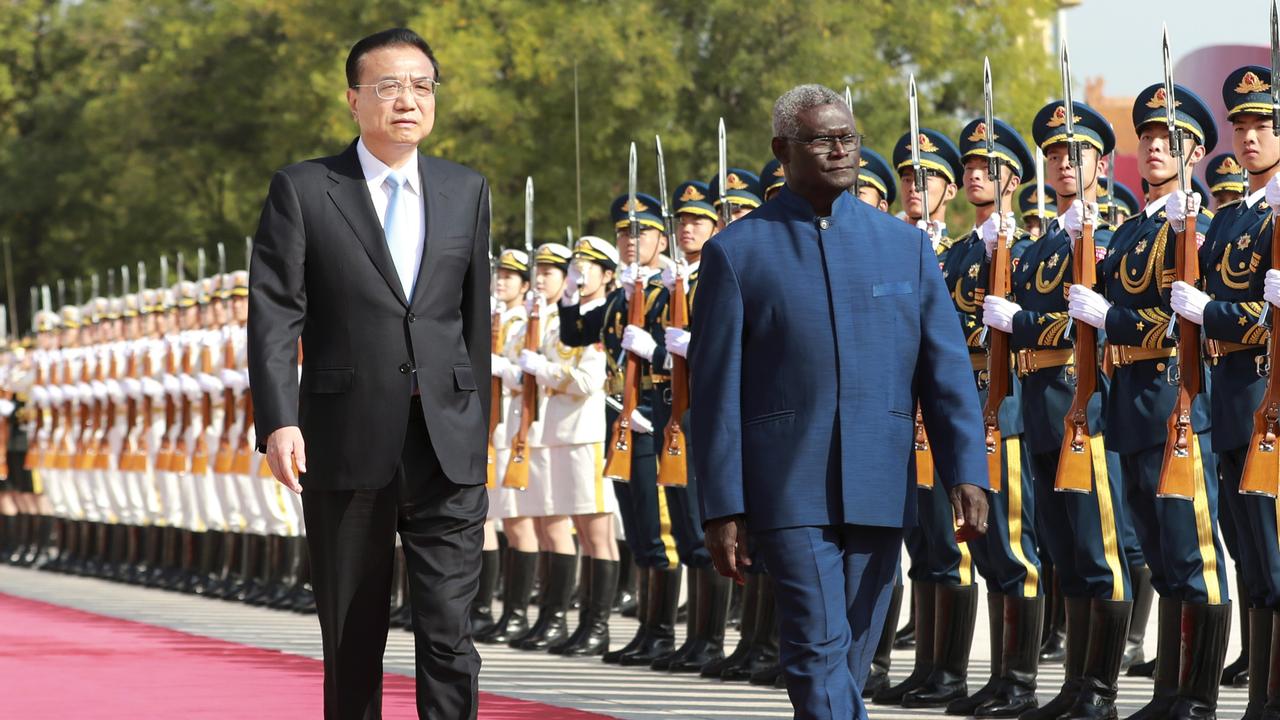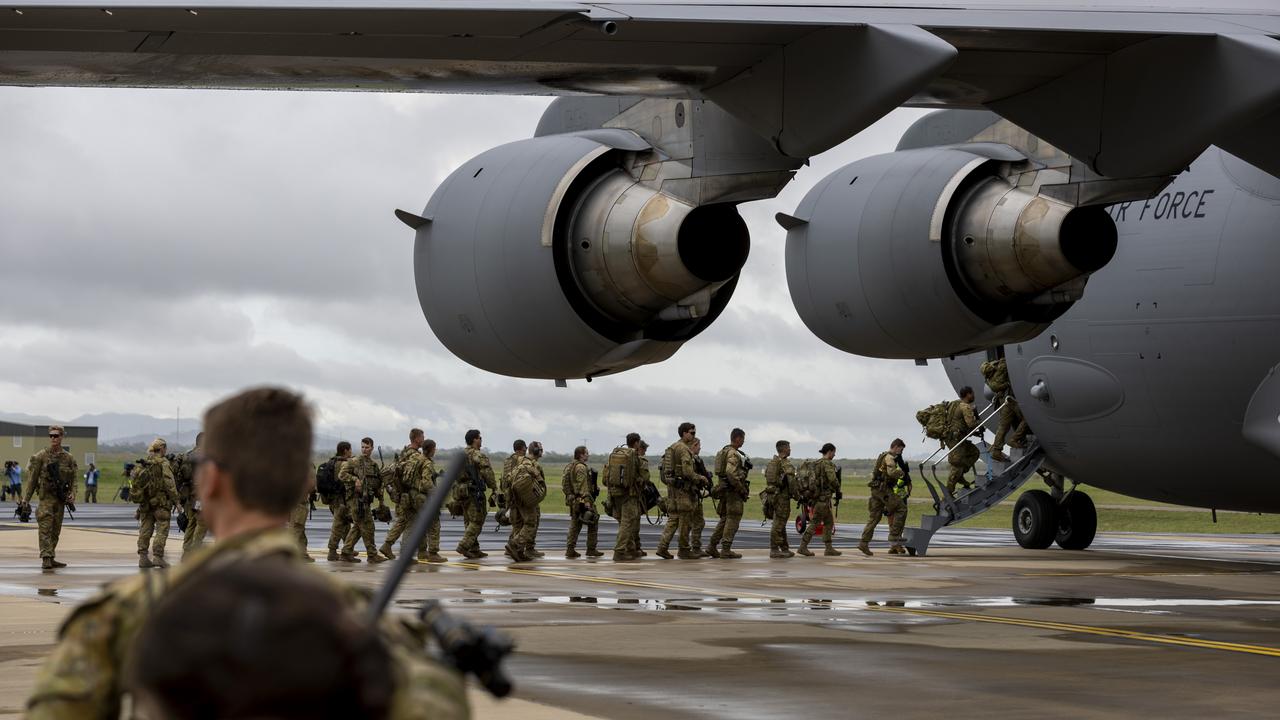China’s Solomon Islands deal shows how Australia pissed away its chance
The warning signs were there, but Australia screwed up the chance to deal with the Solomon Islands. As Beijing moves in, this is how we got it so terribly wrong.
Almost two decades ago a friend of mine accompanied the Australian-led Regional Assistance Mission to the Solomon Islands.
While there he witnessed a briefing to locals by a DFAT official accompanied by an armed Australian soldier.
The official explained that the purpose of the mission was to restore law and order to the Solomons and concluded by asking the locals if they had any questions.
Yes, one of the locals replied, staring at the soldier’s machine gun. Could he please shoot the crocodile that had been eating all their dogs?
That single exchange alone tells you everything you need to know about Australia’s relationship with the Solomon Islands. Suffice to say, we weren’t there to shoot crocodiles.
Now were we just there to restore law and order. Yes, the Australian mission was to establish stability and rebuild institutions destroyed by the fighting and riots — if they were even there in the first place — but it wasn’t just so everyone could hold hands and sing Kumbayah. It was because our own national security depended on it.

Not that we even realised it at the time. Australia had little interest in getting sucked into the Solomons quagmire until the Americans — still reeling from September 11 — pointed out to us that having a violent failed state on your doorstep wasn’t exactly world-class strategic positioning.
Australia shouldn’t have had to have been reminded of this. Six decades earlier, in 1942, the Solomons were the site of the first Allied offensive against the invading Japanese forces, who were seeking to cut off Australia from the US by seizing the main island of Guadalcanal.
Yet even the official Royal Australian Navy (RAN) history of this key event in World War II alludes to our national amnesia.
“Whereas most Australians are familiar with the determined resistance and subsequent counteroffensive by Australian soldiers along the Kokoda Track, the concurrent actions of Australian sailors at Guadalcanal are often forgotten, but are perhaps equally as important to those who wish to better understand the fundamentals of Australian defence,” military historian Dr Gregory P Gilbert writes on the RAN website.
“After all, as an island nation, defence of our sea communications has always been vital.”
In particular, as anyone in possession of a piece of string would understand, our sea communications with the USA — then, as now, our strongest and most critical strategic partner.

Yet even after this existential threat to our nation in 1942, and even in the aftermath of the most brazen attack on American soil in 2001, we still needed reminding of this less than two years later when George W Bush told our government that the Solomon riots were a binfire we should probably not leave to burn.
Thus the RAMSI mission was born in 2003. Exactly a decade later it entered a “transitional” phase, and four years later it ended, on June 30, 2017.
“Law and order have been restored, national institutions have been rebuilt and the Solomon Islands economy has been reformed,” reads the official account on the RAMSI website — a website that may soon need to be updated.
For ironically, given its genesis, RAMSI’s Bush-esque pronouncement of “Mission Accomplished” now seems a tad premature. With the Solomons now on the way to becoming a client-state of China the reform we’re getting doesn’t seem to be the one we spent $2.6 billion to achieve.
So how on earth did we drop a couple of bill just to drop a bowling ball on our own big toe?
Well given that what we can only euphemistically call our “strategy” is clearly divorced from reality, we might as well turn to the world of fantasy. And so I was immediately reminded of the famous quote from JRR Tolkien’s The Lord of the Rings — widely regarded as an allegory for WWII: “Some things that should not have been forgotten were lost.”
Australia forgot the Solomons because we have lost our corporate memory. There has been so much leadership change, so much churn at the uppermost levels of government, that the primary focus of successive administrations has been politics, not policy, and certainly not foreign policy.
With every past prime minister of the last 15 years cast out in their first term, and the inevitable accompanying ministerial exodus, it is hard to escape the conclusion there was simply no one left to remember and that some things that should not have been forgotten were lost.
Good government requires experience and experience takes time. This should be a statement of the screamingly obvious yet it is a truth that both major parties have internally sabotaged while voters looked on in horror.
In this light it seems ironic that we were ever called upon to instruct the Solomon Islands on political stability in the first place. The only difference is that our sturdy institutions and conventions saved us from a similar chaos.
But we also buggered up. We blew up our leaders and screwed our alliances and allowed a tiny country entirely within our sphere of influence to be wholly adopted by China in spite of one of the most interventionist and expensive peacetime foreign policy exercises our modest nation has ever launched.
What is the point of RAMSI, what is the point of DFAT and what is the point of our foreign intelligence service ASIS if our political leadership is simply going to take all that work, all those resources and all that knowledge and simply piss it away into the winds of ignorance.
Watch Joe on The Blame Game — 8.30pm Fridays on Sky News






